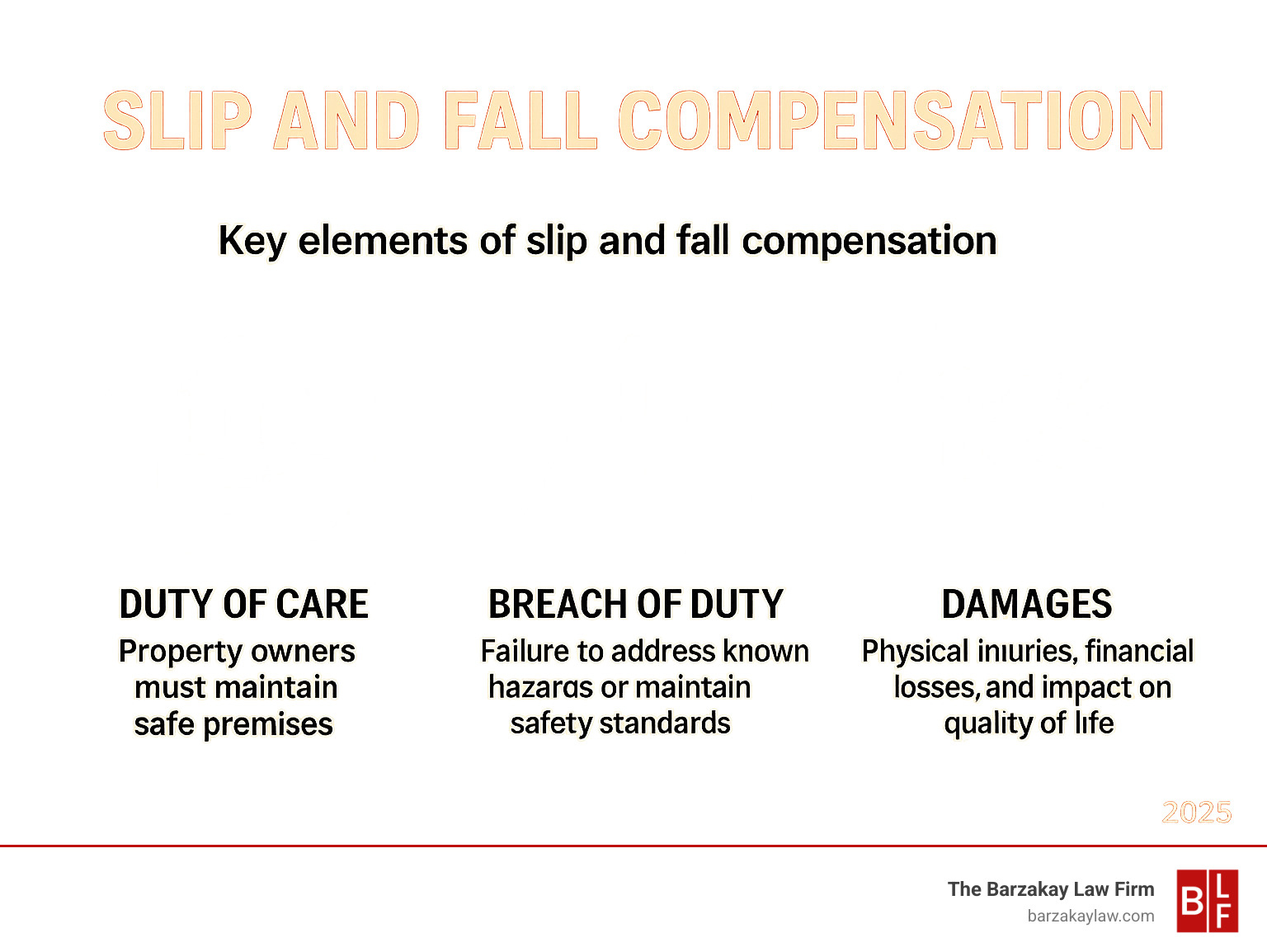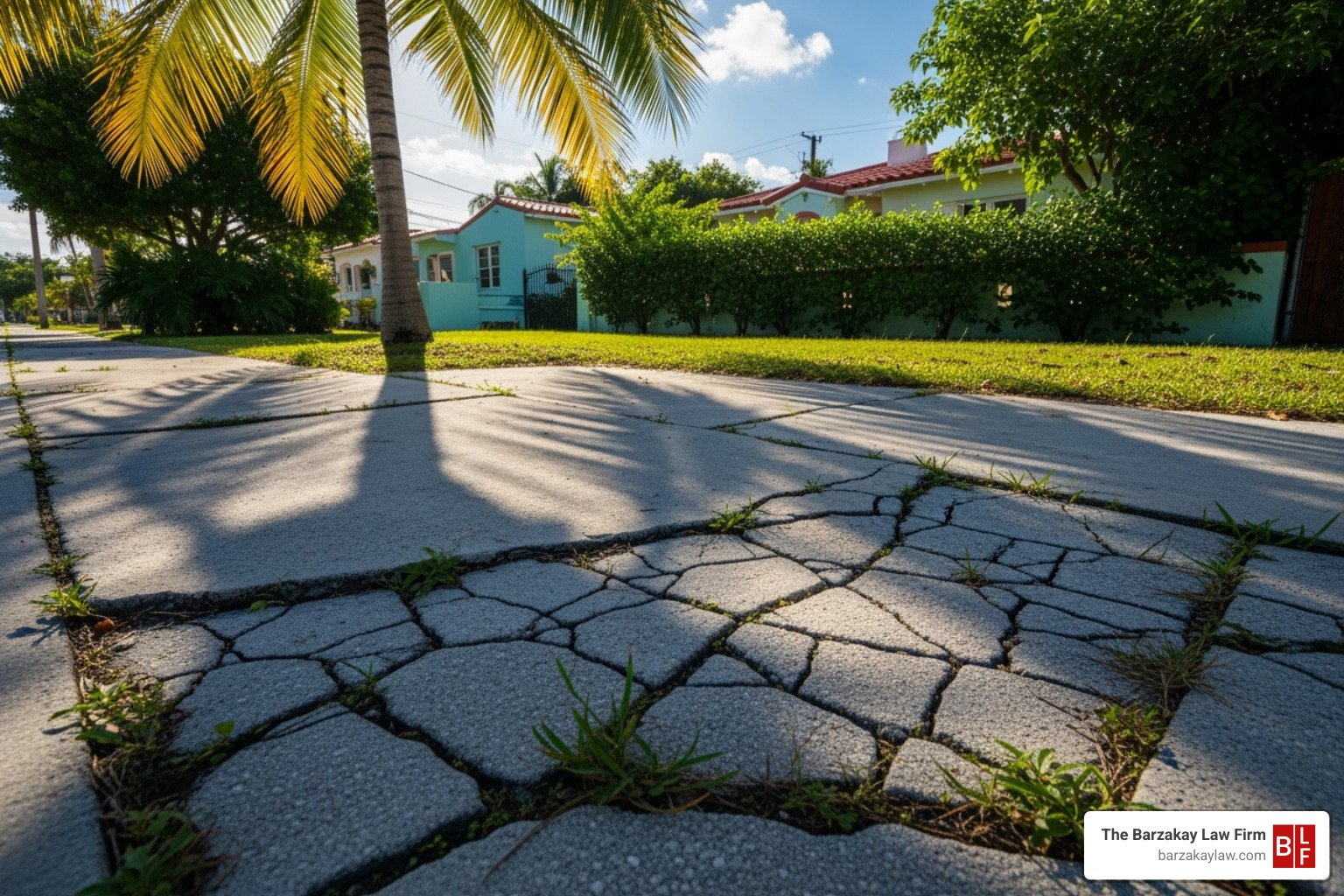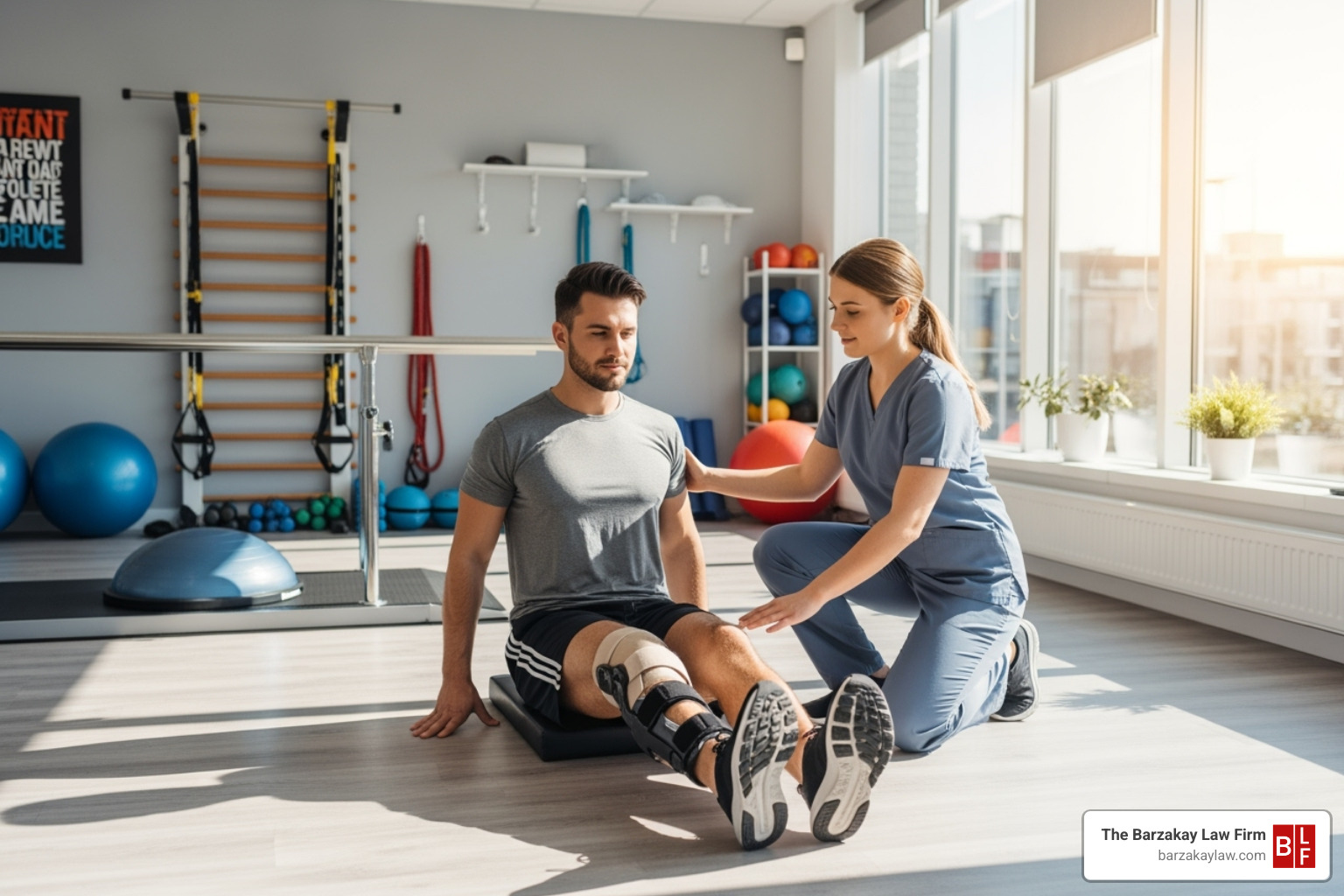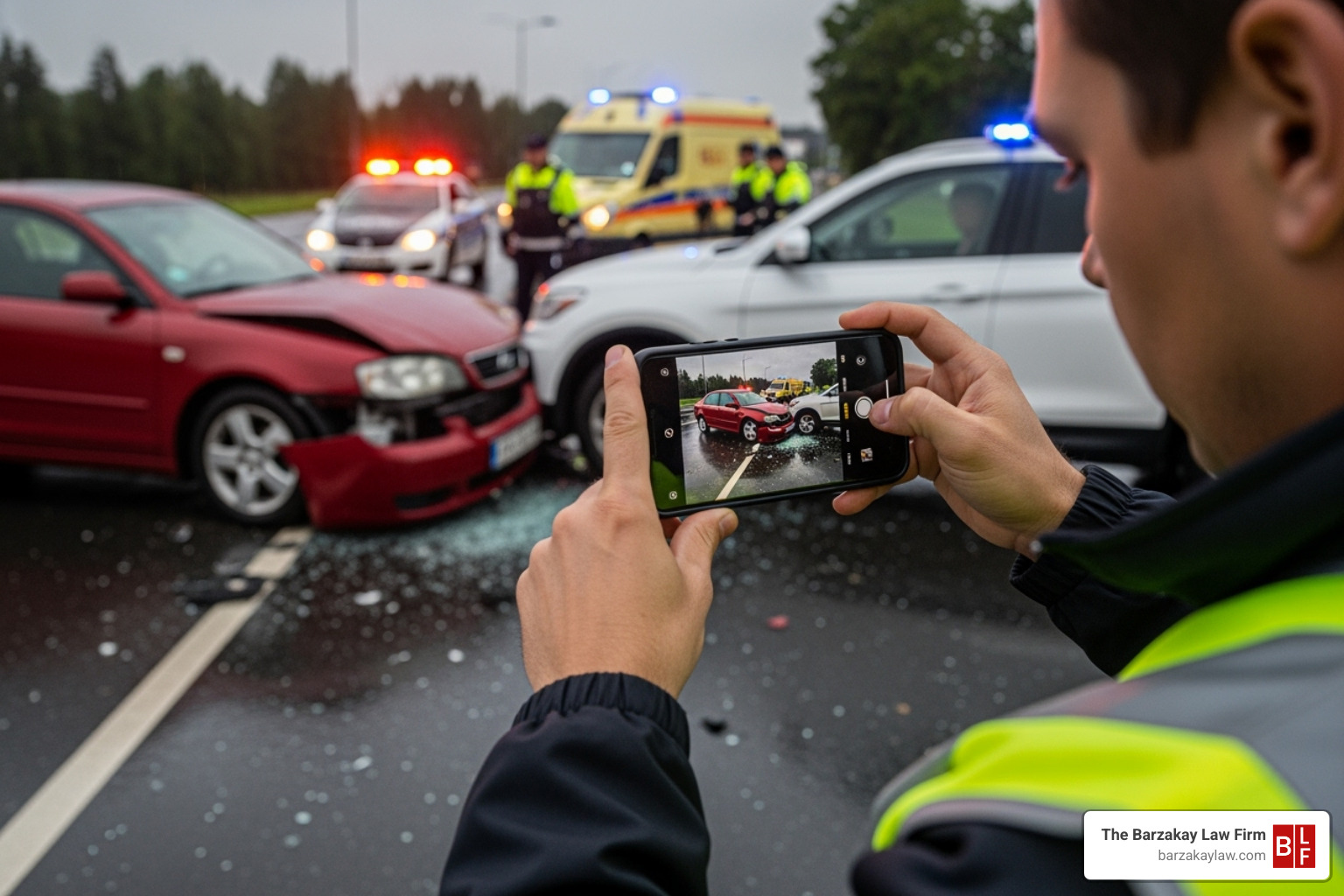Why Understanding Slip and Fall Compensation Matters After an Accident
Slip fall compensation can range from thousands to hundreds of thousands of dollars. If you’ve fallen due to someone else’s negligence in South Florida, understanding your potential compensation is vital for your financial recovery.
Key compensation categories include:
- Medical expenses: Past and future treatment costs
- Lost wages: Time away from work
- Pain and suffering: Physical and emotional distress
- Rehabilitation costs: Physical therapy and ongoing care
- Loss of enjoyment: Impact on quality of life
According to the Centers for Disease Control and Prevention (CDC), millions of adults suffer nonfatal falls annually, many requiring emergency care. In Florida areas like Miami, Hollywood, and Boca Raton, these accidents are common in grocery stores, restaurants, and apartment complexes.
The amount you receive depends on injury severity, evidence strength, and the property owner’s fault. Minor injuries might settle for a few thousand dollars, but severe injuries like traumatic brain or spinal cord damage can lead to payouts over $100,000.
Understanding these basics helps you make informed decisions. When medical bills mount and you can’t work, knowing your rights is essential for moving forward.
Establishing Fault: Who is Responsible for Your Fall?
When a slip and fall happens on someone else’s property, determining responsibility is key. In Florida, these cases are governed by premises liability law, which holds property owners accountable for injuries from unsafe conditions.
A property owner has a legal “duty of care” to keep their premises reasonably safe. This involves regular inspections, identifying hazards, and either fixing them or providing warnings. Failure to do so can be considered negligence, making them liable for damages. This applies to “foreseeable harm”—dangers they knew or should have known about. For example, a store manager who ignores a recurring leak that causes a fall could be held responsible.
Proving negligence can be challenging. Property owners and insurers often use defenses like claiming the hazard was “open and obvious” or that your own “contributory negligence” played a part. Florida’s comparative negligence rules, which we’ll cover later, affect how this is handled.
For more details on how these cases work, see our guide on Florida Premises Liability Slip Fall Attorneys.
Common Causes of Slip and Fall Accidents
Most slip and falls stem from preventable hazards. Recognizing these common causes helps identify negligence.
Frequent culprits include:
- Wet Floors: Uncleaned spills, mopped floors without warning signs, or tracked-in water.
- Uneven Surfaces: Cracked sidewalks, potholes, loose floorboards, or abrupt changes in flooring.
- Poor Lighting: Dimly lit stairwells, hallways, or parking lots that hide hazards.
- Cluttered Walkways: Obstacles like boxes, debris, or items left in aisles.
- Broken Stairs or Handrails: Damaged steps or missing/wobbly handrails.
- Weather-Related Hazards: Uncleared ice or snow at entrances or in parking lots.
- Torn Carpeting: Frayed or bunched-up rugs and carpets.
These hazards are common across South Florida in places like grocery stores, restaurants, hotels, and apartment complexes in Miami, Boca Raton, and beyond. Property owners are responsible for keeping these areas safe.
Types of Injuries Sustained
A slip and fall can cause injuries ranging from minor bruises to life-altering trauma. The severity of your injury is a major factor in your slip fall compensation claim’s value.
Common injuries include:
- Soft Tissue Injuries: Damage to muscles, ligaments, and tendons, such as sprains and strains. These can cause significant pain and require rehabilitation.
- Fractures and Broken Bones: Falls often cause broken arms, wrists, hips, and ankles. Hip fractures are especially serious and may require surgery.
- Head Injuries and Traumatic Brain Injury (TBI): Hitting your head can cause concussions or more severe TBIs with long-lasting cognitive and emotional effects.
- Spinal Cord Injuries: A fall can lead to herniated discs or even spinal cord damage, potentially causing paralysis or permanent nerve damage.
- Bruises and Lacerations: While less severe, deep cuts and bruises can be painful and require medical care.
Always seek medical attention after a fall, even if you feel fine. Some injuries, like those to the head or spine, have delayed symptoms. A medical record is vital for documenting your injuries for a compensation claim.
Calculating Your Potential Slip and Fall Compensation
After a fall, you’re likely wondering about the costs and if you can be compensated. It’s a natural concern when facing medical bills and lost work.
There’s no magic formula for slip fall compensation. Each case is unique, and the payout reflects that. Your claim is built on two pillars: economic damages (actual financial losses) and non-economic damages (pain, suffering, and life changes).
The goal is to make you whole by covering every loss caused by the negligence.
Our guide on filing a Slip and Fall Injury Claim can walk you through the initial steps.
Types of Damages in a Slip and Fall Compensation Claim
Compensation covers the full impact of the accident on your life, including hidden costs.
- Medical expenses are central to any claim. This includes everything from the initial ER visit to surgery, prescriptions, and follow-up care. Crucially, it also covers future medical needs, like ongoing physical therapy or anticipated surgeries.
- Lost income and earning capacity covers not just the paychecks you’ve already missed, but also how the injury might affect your future ability to earn, which is especially relevant for those in physically demanding jobs common in South Florida.
- Rehabilitation costs include physical and occupational therapy to help you recover and relearn daily tasks, as well as counseling for emotional trauma.
- Pain and suffering compensates for the physical discomfort and emotional distress caused by the injury, such as chronic pain or anxiety.
- Loss of enjoyment of life addresses how the injury prevents you from participating in activities you once loved, from hobbies to family time.
- Punitive damages may be awarded in rare cases of extreme negligence but are not common in slip and fall claims.
Factors That Influence Your Slip and Fall Compensation
Your compensation amount is based on several key factors:
- Severity of injury: This is the most significant factor. A minor sprain will result in a much lower payout than a life-altering traumatic brain injury.
- Strength of evidence: Strong evidence, like photos of the hazard, security footage, and witness testimony, strengthens your negotiating position.
- Clarity of liability: A clear case of owner negligence (e.g., ignoring a known hazard for weeks) is stronger than a case where fault is disputed.
- Insurance policy limits: The property owner’s insurance policy sets a maximum available amount, which can be a factor in cases with catastrophic injuries.
- Your age and health: Your age, health, and occupation before the fall affect the calculation of long-term losses. A pre-existing condition that was worsened by the fall is still compensable.
- Long-term impact on your life: The overall effect on your career, relationships, and daily activities is a critical component of your claim’s value.
Each factor is carefully weighed to determine your final slip fall compensation.
The Legal Journey: Steps to Take and What to Expect
After a slip and fall, the steps you take immediately can greatly affect your slip fall compensation claim. Protecting your health and preserving evidence are key.
Here are the essential actions to take:
- Seek Medical Attention: Your health is the priority. Get a medical evaluation immediately, as some serious injuries have delayed symptoms. Medical records are vital evidence.
- Document the Scene: If it’s safe, take photos and videos of the hazard that caused your fall, the surrounding area, and your injuries.
- Report the Incident: Inform the property owner or manager right away. Ask for an official incident report and get a copy. Avoid admitting fault.
- Gather Witness Information: Get the names and contact details of anyone who saw the fall. Their testimony can be invaluable.
- Keep Detailed Records: Create a file for all accident-related documents, including medical bills, receipts, and records of lost wages.
- Consult with a Personal Injury Attorney: A lawyer can advise you on your rights, guide you through the process, and ensure you meet critical deadlines.
For more guidance, explore our resources on Slip and Fall Legal Advice.
Settling Out of Court vs. Going to Trial
Most slip fall compensation claims are resolved through either an out-of-court settlement or a trial. The vast majority end in a settlement.
The negotiation process begins once we have a full understanding of your injuries and losses. We present a demand to the insurance company, which often responds with a low offer. This is where skilled negotiation is critical.
Here’s a comparison of the two paths:
| Factors | Settling Out of Court | Going to Trial |
|---|---|---|
| Time | Generally much faster, often months to a year. | Can take years, involving extensive legal procedures like findy, motions, and court scheduling. |
| Cost | Lower legal expenses, avoids costly litigation fees. | Significantly higher, including court fees, witness fees, deposition costs, and extended attorney hours. |
| Outcome Certainty | Guaranteed outcome, you agree to the final amount. | Uncertain. A judge or jury decides the outcome, which can be unpredictable and may not favor your case. |
| Privacy | Confidential. Settlement terms are typically private. | Public record. Court proceedings and outcomes are open to the public, including sensitive personal and financial details. |
| Control | You retain control over the decision to accept or reject the offer. | Control shifts to the judge or jury; you lose the ability to directly influence the final decision. |
| Stress | Generally less stressful, avoids the anxiety of a public trial. | Highly stressful, requiring your presence and testimony, often in an adversarial environment. |
Why Most Slip and Fall Cases Settle
Contrary to popular belief, about 95% of personal injury cases, including slip fall compensation claims, are settled before trial. There are several compelling reasons for this:
- Risk and Cost: Trials are expensive and unpredictable for both sides. The costs of litigation, including court fees and witnesses, can be substantial.
- Speed: Settlements provide a much faster resolution. A case can be settled in months, while a trial can take years.
- Certainty: A settlement offers a guaranteed payment. A trial’s outcome is never certain, and you could receive less than you hoped for or nothing at all.
- Reduced Stress: The trial process is emotionally draining. Settling allows you to avoid the stress of depositions and testifying in court.
- Control: During settlement negotiations, you have the final say on accepting or rejecting an offer. In a trial, the decision is left to a judge or jury.
While we are always prepared for trial, our goal is to secure fair slip fall compensation for you as efficiently as possible.
Frequently Asked Questions about Slip and Fall Claims
When you’re dealing with the aftermath of a slip and fall accident, it’s natural to have questions about your rights and options. We hear these same concerns from families across South Florida every day, and we want to make sure you have clear, honest answers about pursuing slip fall compensation.
How long do I have to file a slip and fall claim in Florida?
In Florida, the statute of limitations gives you two years from the date of your accident to file a lawsuit for a slip and fall claim. This is a strict deadline.
If you miss this two-year window, you will almost certainly lose your right to seek compensation in court, regardless of your injury’s severity. While two years may seem like a long time, building a strong case involves gathering evidence, completing medical treatment, and negotiating with insurers, all of which takes time.
Evidence can be lost and witness memories can fade, so it is crucial to act quickly. There are very few exceptions to this rule, so do not delay in starting the process.
What if the fall happened on government property in Miami-Dade or Broward County?
Claims against government entities in Miami-Dade or Broward County are more complex due to “sovereign immunity.”
While Florida law requires you to provide written notice of your claim to the government agency within three years, many local entities have much shorter notice periods, sometimes as little as 30 to 180 days. These notice requirements are strict, and missing them can bar your claim, even if you are within the two-year statute of limitations for filing a lawsuit.
These cases also have different liability standards and caps on damages that can limit your slip fall compensation. If you fell on government property, such as a public sidewalk or park, it is critical to contact an attorney immediately.
Can I still claim compensation if I was partially at fault for my fall?
Yes, you can. Being partially at fault does not automatically prevent you from receiving slip fall compensation in Florida.
For accidents after March 24, 2023, Florida uses a “modified comparative negligence” rule. This means your compensation is reduced by your percentage of fault. For example, if you are awarded $100,000 but found to be 30% at fault, your award is reduced to $70,000. However, if you are found to be 51% or more at fault, you cannot recover any damages.
Insurance companies will often try to shift blame by arguing you were distracted, wearing improper shoes, or ignored warning signs. Our job is to counter these arguments and demonstrate that the property owner’s negligence was the primary cause of your fall.
Do not let concerns about partial fault stop you from exploring your legal options. The property owner may still be held responsible for the dangerous condition that led to your injury.
Protecting Your Rights and Securing Your Future
A slip and fall accident can leave you with injuries, medical bills, and uncertainty. You don’t have to steer this difficult time alone.
This guide has covered the key aspects of slip fall compensation, from establishing fault to the legal process. The most important steps are to seek medical care, document the scene, report the incident, and gather witness information. Florida’s deadlines for filing a claim are strict, so acting quickly is essential.
Navigating a premises liability claim can be overwhelming, especially when dealing with insurance companies trying to minimize their payout. Having experienced legal guidance is crucial.
At The Barzakay Law Firm, we help families across South Florida—from Hollywood to Miami to Boca Raton—secure the compensation they deserve. We work on a contingency fee basis, meaning you pay no legal fees unless we win your case. This allows you to focus on recovery without worrying about upfront costs while we handle the insurance companies, evidence, and negotiations.
Every case is unique, and personalized legal advice is vital. Don’t let an accident define your future. If you’ve been injured in a slip and fall in South Florida, we are here to help. Contact a personal injury attorney in Hollywood for a consultation to understand your rights and what your case may be worth. Your path to recovery starts here.




